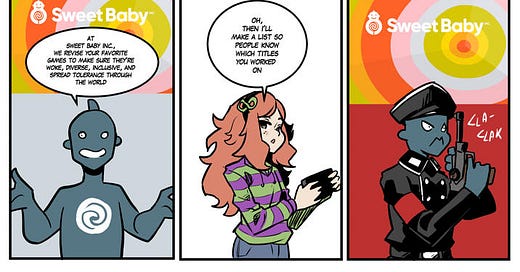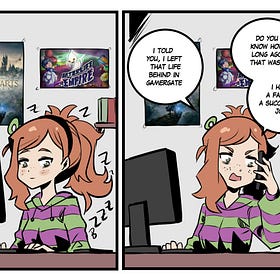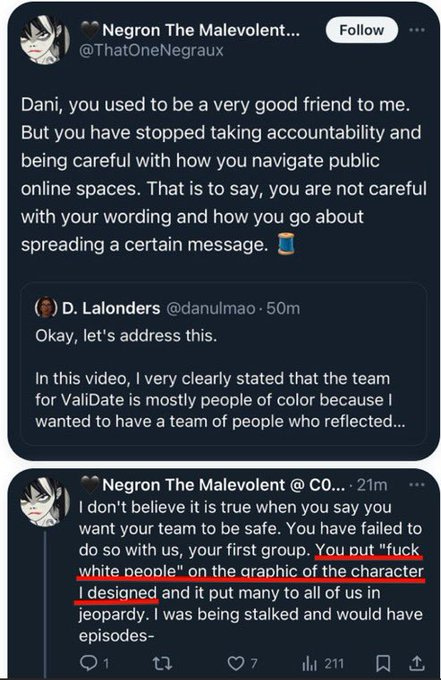The Second Coming of Gamergate: Immediate Post-mortem
Even as the initial catalyst, sparked by Sweet Baby Inc. employees against Brazilian gamer Kabrutus, fades into the horizon, the stakes have only grown larger and more heated.
Usually when it comes to post-mortems, they’re penned long after the posts being commentated on were published. In the case of the Second Coming of Gamergate piece, it’s more than just an ongoing event. Enough has happened within less than a week of that article to warrant its own, rather than just slap on an addendum.
The Second Coming of Gamergate
If anyone familiar with video games were asked what consultancy firm Sweet Baby Inc. (SBI) does at the start of 2024, chances are they wouldn’t be aware of what it even was. If one tried to make a connection between that and the Gamergate controversy, as I touched on through the lens of the KotakuInAction subreddit back in December 15, 2023, it would se…
Given how quick news cycles and trending social media topics tend to be, especially in the gaming scene, Gamergate 2 is proving to be a notable exception. This has been as much to do with the very games consultants, activists and journalists trying to squash it as the ones criticizing them. Yet even as the initial catalyst, sparked by Sweet Baby Inc. employees against Brazilian gamer Kabrutus, fades into the horizon, the stakes have only grown larger and more heated.
As it turned out on March 22, Dani Lalonders, the former SBI alumni mentioned in passing as working on Marvel’s Black Panther and defending discriminatory hiring practices, had gone on a (since deleted) tirade, preserved by ex-Blizzard executive Mark “Grummz” Kern. While suspect in itself, with her denying the documented evidence as misinformation, the replies from an ex-friend and coworker revealed that Lalonders not only stopped taking accountability online but had inserted flagrant racism against white people in the indie game they were both working on at the time, ValiDate. That said ex-friend deleted much of those comments, yet seemed more concerned in what’s left available over racists going after her rather than the bigotry itself is just as damning. As if to say that such hypocritical ideas are fine, so long as they are aimed at acceptable targets, and no one finds out.
Meanwhile, news has surfaced that Microsoft Gaming’s “Team Xbox” had released its “Gaming for Everyone Product Inclusion Framework for Game Developers” at GDC 2024 on March 20. While having the benign aim of weaving “intentionality and inclusion,” the devil in the details caught social media traction on March 25. As highlighted by a Niche Gamer editorial the same day, the recommendations under the “Help Customers Feel Seen” section of its website, which cautioned against “negative gender stereotypes,” would unfairly render various female characters in games (Western or otherwise) as “objectification.” Brad Glasgow, on the other hand, noted how thanks to using flawed DEI surveys (including those used by the ADL), and Geena Davis Institute data previously criticized for conflating games with violence and racism as references, the reliability of Microsoft’s initiative is put into severe doubt.
Then, there’s how the situation has escalated even further, beginning with one Jules Hardy. On March 22, while defending Black Girl Gamers, she called for a “final purge” dissenting gamers, stating how she had been arguing “for decades” whether there should be a “full detox of these dude so we can get back to the positive gaming community we have been creating.” In addition to using herself being a non-binary woman to deflect criticism, and her long-time work for British mainstream media institutions like the BBC, Hardy kept at it as recently as March 26, albeit reframing it instead as wanting to “purge the hate and vitriol from gamers” refusing to evolve, which comes off instead as disenfranchising those deemed hateful by her. Combined with how the consultancy firm also used the opportunity to threaten legal action against any critic quoting its own words, these have only added more fuel to the fire.
To a point, what’s transpired has been all but expected. The way SBI allies and the media have responded is an echo of the original Gamergate’s first year, with Digital Trends editor Giovanni Colantonio’s March 26 feature coming off like a farcical litany that wouldn’t have been out of place among “Gamers are Dead” articles in 2014. At the same time, however, their behavior and antics go beyond irresponsibility. From cliquish if not hubristic claims of representing the industry and gaming community, seen in the grandstanding of groups like the International Game Developers Association (IGDA) and multimedia DEI consultancy firm NNESAGA, to the sort of inflammatory rhetoric Hardy pushed in her ranting, it is as though a mask had slipped. Now, there is apparent proof beyond doubt of the utter lack of good faith and empathy that had been lurking underneath.
This has inevitably led to ample backlash on social media, such as mocking jabs on how women look in certain Microsoft-published games for seemingly being in line with those flawed Product Inclusion recommendations, including from more mainstream content creators like LegacyKillaHD. It is likewise fostering even more animosity than what had already existed. With documented proof of not only widespread collusion to stifle opposing views but also widening connections within the industry and beyond, the anger among dissenting gamers and developers alike has grown more palpable. From a distance, it is not hard to see the culture warriors, cynics, opportunists, and even SBI’s allies circling about, whether to exploit the escalation for their own ends, or find some smoking gun ”proving” the movement is the racist, bigoted and sexist menace the narrative always painted it as.
Gamergate 2, though, is once more showing itself savvier than the first time around. Despite the clear anger, there remains insufficient evidence of any significant harassment, no matter how much media outlets keep redefining the word to include Steam lists based on publicly-available data. From the near-unanimous backlash online against Hardy’s “final purge” remarks to Youtuber Andrew “Legal Mindset” Esquire highlighting how reckless and legally indefensible Black Girl Gamers’ lawsuit threats are (to say nothing of former members who realized what kind of group it is), there is also a growing sense that their enemies have not only failed to learn from a decade ago, but that they are burning through tactics as well as bridges. Kern, perhaps, put it best recently: “Nothing is working and they are desperate.”
Although it is certain that things will get more tumultuous for the Western gaming industry and wider community, what happens when the dust settles is still anyone’s guess. If Kabrutus, the Brazilian at the center of the original squabble with SBI, is any indication, it’s also evident that the Second Coming Gamergate won’t be going down without a fight if it means getting to having something better come out of it. Perhaps, there could be a light at the end of the tunnel, and as more people become aware of the existence of the proverbial rabbit hole, keeping a welcome, if guarded hand open can go a long way into making that better gaming scene a reality.
Whether this fizzles out or lasts another 10 years, it’s definitely worth keeping a close eye on.










No wonder History is not progressing, it's really comes into circle.